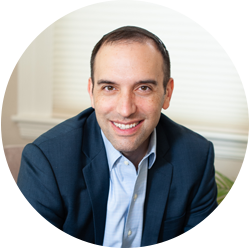Shalom Chaverim,
I hope you all had a healthy and restful summer.
After this week’s Massachusetts primary — and with just two months until the presidential election — I am thinking a lot about choices. At the heart of democracy is our right as citizens to choose the people who will represent us. It can be easy to forget how blessed we are to live in this country, especially when our democracy is so flawed and imperfect. We should remember Winston Churchill’s observation that “democracy is the worst form of government except for all those other forms that have been tried.”
As COVID-19 exacerbates social and political divisions, racial and economic injustice, and collective fear and anxiety in our country, it also amplifies historic debates about the choices that define our country and the inevitable but painful conflicts between our competing values.
The freedom to choose is not only a right, but also a sacred responsibility. In an election season, especially one as fraught as this one, we are acutely aware that our future and the character of our country hang in the balance. The leaders whom we elect will have a profound influence on our lives, our children’s lives, and on the world.
It is the end of summer and the start of a new school year, and most of us are also wrestling with the choices we make every day more than usual. These are choices that, under normal circumstances, we don’t even have to think about. Things like “Should I shop online or go inside a store? Should I get a haircut? Should I spend time with people I care about who aren’t in my ‘bubble?’”
Then there are more complex underlying questions and choices: “How do I navigate my friends’ and family’s different standards for social distancing? How will I reconcile concerns for my children’s health and physical well-being with concerns about their academic and social-emotional development? How should I balance my many roles and responsibilities when I am working from home for the first time in my life?”
We are in the Hebrew month of Elul, a time of heightened introspection and preparation leading up to the High Holidays. In a year when, for many of us, normal High Holiday rituals and routines will be disrupted, perhaps this is a time to double down on our personal preparation. A little more reading. A little more learning. More reaching out to people we want to reconnect with. More time for reflection and introspection.
Most of all, this is a time to shine a light on what the Jewish ethical tradition of Mussar calls “nekudot bechira” or “choice points.”
We become better versions of ourselves, one choice at a time. When we slow down enough to see the number of choices we are constantly making, we can understand ourselves better and become more mindful and intentional about the way we live our lives.
Let’s also remember that this is hard work. One of the most challenging things about the number of unknowns we are facing right now is that making choices, even small ones, is exhausting. It requires mental space to weigh our options, and decide and space in our hearts to stay grounded and calm in the face of uncertainty and doubt. Perhaps this is what the Jewish tradition is referring to when at least one rabbinic commentary says, “There is no joy like the resolution of doubts.”
While being more mindful about our choices is key to improving ourselves and our world, recognizing that so many choices can be overwhelming can also help us to have greater patience and compassion — with ourselves and with one another.
May both greater intentionality and greater compassion be our guides as we enter this very different new year.
Shabbat Shalom,
Rabbi Marc Baker

About the Author
CJP President and CEO Rabbi Marc Baker is an educator, writer, and leadership mentor who is devoting his life to Jewish learning and building Jewish communities.
